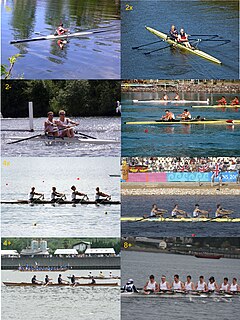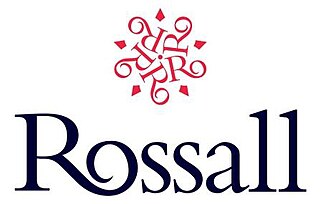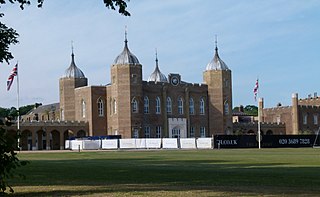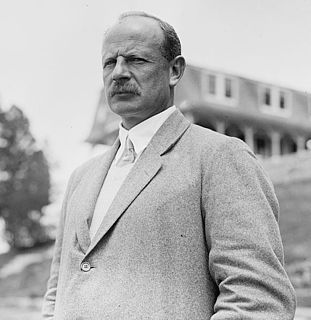Walter Francis Short (1832–1910) was an English academic, schoolmaster, clergyman and rower.

Rowing, sometimes referred to as crew in the United States, is a sport whose origins reach back to Ancient Egyptian times. It involves propelling a boat on water using oars. By pushing against the water with an oar, a force is generated to move the boat. The sport can be either recreational for enjoyment or fitness, or competitive, when athletes race against each other in boats. There are a number of different boat classes in which athletes compete, ranging from an individual shell to an eight-person shell with a coxswain.
Short was the son of Rev William Short, vicar of Chippenham and his wife Jane Awdry, eldest daughter of John Awdry of Notton, Wiltshire. [1] He matriculated at New College, Oxford in 1851. [2] He was bowman in the winning Oxford University eight in the Grand Challenge Cup at Henley Royal Regatta in 1852, [3] and was runner-up in Silver Goblets paired with Martin Irving against Philip Nind and Henry Raine Barker in the final. [4] He was in the winning Oxford crew in the Grand Challenge Cup crew again in 1853. In 1854 he was in the winning Oxford crew in the Boat Race and at Henley he won Silver Goblets paired with Edward Cadogan. Short and Cadogan lost in the final of SIlver Goblets in 1855 to A. A. Casamajor and Josias Nottidge.

Chippenham is a large historic market town in northwest Wiltshire, England. It lies 20 miles (32 km) east of Bristol, 86 miles (138 km) west of London and 4 miles (6 km) west of The Cotswolds AONB. The town was established on a crossing of the River Avon and some form of settlement is believed to have existed there since before Roman times. It was a royal vill, and probably a royal hunting lodge, under Alfred the Great. The town continued to grow when the Great Western Railway arrived in 1841; it is now a major commuter town.

New College is one of the constituent colleges of the University of Oxford in the United Kingdom. Founded in 1379 by William of Wykeham, the full name of the college is St Mary's College of Winchester in Oxford. The name "New College", however, soon came to be used following its completion in 1386 to distinguish it from the older existing college of St. Mary, now known as Oriel College.

In rowing, the "bow" or sometimes "bows" of a boat is the forward part of the hull, the point that is most forward when the vessel is underway. The other end of the boat is called the stern. The rower closest to the bow of the boat is also known as "bow".
Short was a Fellow of New College from 1851 to 1883. He was an assistant master at Rossall School from 1857 to 1859 and became headmaster of Oswestry Grammar School in 1860. [5] In 1863 he returned to New College, where he was subwarden in 1863, burser in 1864 and tutor from 1864 to 1870. He became junior dean in 1867 and was proctor from 1869 to 1870. [2] In 1879 he became chaplain of Royal Military Academy, Woolwich and in 1875 became warden of St Paul's College, Stony Stratford, Buckinghamshire until 1878. He was tutor of Keble College, Oxford from 1881 until 1882 [5] when he became rector of Donhead St Mary, Wiltshire in 1882 until 1901. [6]

Rossall School is a British, fee paying co-educational, independent school, between Cleveleys and Fleetwood, Lancashire. Rossall was founded in 1844 by St Vincent Beechey as a sister school to Marlborough College which had been founded the previous year. Its establishment was "to provide, at a moderate cost, for the sons of Clergymen and others, a classical, mathematical and general education of the highest class, and to do all things necessary, incidental, or conducive to the attainment of the above objects." Along with Cheltenham, Lancing and Marlborough, Rossall was part of a flurry of expansion in education during the early Victorian period. These schools were later complemented by others such as Clifton, Wellington, Malvern and Radley.

The Royal Military Academy (RMA) at Woolwich, in south-east London, was a British Army military academy for the training of commissioned officers of the Royal Artillery and Royal Engineers. It later also trained officers of the Royal Corps of Signals and other technical corps. RMA Woolwich was commonly known as "The Shop" because its first building was a converted workshop of the Woolwich Arsenal.

Stony Stratford is a constituent town of Milton Keynes, Buckinghamshire, England. Historically it was a market town on the important route from London to Chester. It is also a civil parish with a town council within the Borough of Milton Keynes. It is in the north west corner of Milton Keynes, bordering Northamptonshire and separated from it by the River Great Ouse.
Short died in Wiltshire at the age of 79.




